Regular elections in Croatia are mandated by the Constitution and legislation enacted by Parliament. The presidency,Parliament,county prefects and assemblies,city and town mayors,and city and municipal councils are all elective offices. Since 1990,five presidential elections have been held. During the same period,nine parliamentary elections were also held. In addition,there were six nationwide local elections. Croatia has held two elections to elect 11 members of the European Parliament following its accession to the EU on 1 July 2013.

Parliamentary elections were held alongside the presidential elections in Croatia on 2 August 1992,the first after independence and under the new constitution. All 138 seats in the Chamber of Representatives were up for election. The result was a victory for the Croatian Democratic Union,which won an absolute majority of 85 seats. Voter turnout was 75.6%.
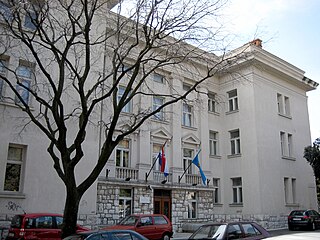
The University of Rijeka is in the city of Rijeka with faculties in cities throughout the regions of Primorje,Istria and Lika.

The Josip Juraj Strossmayer University of Osijek,commonly known as the University of Osijek (UNIOS),is a public university based in Osijek,Croatia. Established in 1975,it is the flagship institution of higher education in Slavonia,and one of the largest and oldest universities in Croatia.

Dragan Primorac is a Croatian physician,geneticist and forensic scientist. He is the first recipient of the title “Global Penn State University Ambassador”. Currently,he serves as the Chair of the International Affairs Committee of the American Academy of Forensic Sciences and as President of the International Society for Applied Biological Sciences. He is a member of the International Consortium for Personalised Medicine Executive Committee established by The European Commission. In November 2015 he was elected to lead the State competitiveness cluster in personalized medicine while in 2018 he was elected to lead the Croatian Society for Human Genetics and in 2019 the Croatian Society for Personalised Medicine. In March of 2021. he is appointed as Professor Emeritus at National Forensic Sciences University in India.

MatjažKek is a Slovenian professional football manager and former player who is the manager of the Slovenia national team.
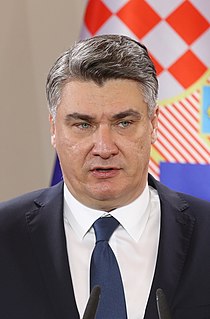
Zoran Milanović is a Croatian politician serving as President of Croatia since 19 February 2020. Prior to assuming the presidency,he was prime minister from 2011 to 2016 and president of the Social Democratic Party from 2007 to 2016.
Rene Maurin is a Slovene theatre director,film director and screenwriter.
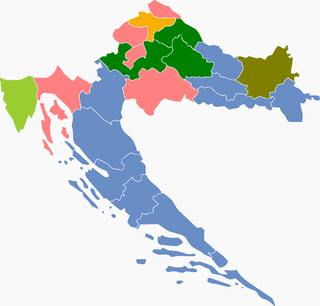
The 2009 Croatian local elections were held on 17 May,with the second round held on 31 May where necessary.

Parliamentary elections were held in Lithuania on 8 October 2000. All 141 seats in the Seimas were up for election,71 of them in single-seat constituencies based on first-past-the-post voting;the remaining 70,in a nationwide constituency based on proportional representation. Altogether,around 700 candidates competed in the single-seat constituencies,while over 1,100 candidates were included in the electoral lists for the nationwide constituency.
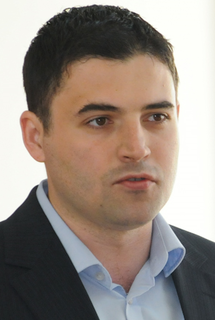
Davor Bernardić is a Croatian physicist and politician who served as the president of the Social Democratic Party from 2016 to 2020. He also served as one of four SDP vice-presidents,leader of the SDP's Zagreb branch,and president of the SDP Youth Forum. Bernardićhas been elected to the Croatian Parliament five times,representing the 1st electoral district.

Željko Jovanović is a Croatian politician and physician who served as Minister of Science,Education and Sports from 2011 until 2014. He is a member of the center-left Social Democratic Party of Croatia.

Željko Reiner is a Croatian physician,politician,university professor,member of the Croatian Academy of Sciences and Arts and former Minister of Health and Social Welfare who served as the 10th Speaker of the Croatian Parliament since independence and the 20th speaker overall,from December 2015 until October 2016.
The following is a timeline of the history of the city of Rijeka,Croatia.

Valter Flego is a Croatian politician who has been a Member of the European Parliament for Croatia since 2 July 2019. Previously he had served as the 4th prefect of Istria County from 2013 to 2019,as well as he served three terms as mayor of the town of Buzet. He is a member of the liberal Istrian Democratic Assembly (IDS) party.

Andrej Grabrovec,Slovenian artist,engineer,sculptor and photographer,born in 1959.
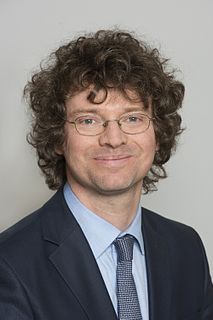
Predrag Šustar is a Croatian philosophy professor and politician who served as Minister of Science,Education and Sports in the Cabinet of Tihomir Oreškovićfrom 22 January 2016 until 19 October 2016. He is member of the center-right Croatian Democratic Union.
Željko Burić is a Croatian ophtalmologist and politician who is serving as mayor of Šibenik since 2013. Before taking mayoral office,he served as the director of the General Hospital of Šibenik-Knin County in Šibenik.
The 2017 Rijeka local elections were held on 21 May and 4 June 2017 for the Mayor of Rijeka and members of the Rijeka city council. Vojko Obersnel,the 14th and incumbent mayor who has been in office since 2000,ran for a sixth consecutive four-year term,finishing in 1st place with 41,00% of the vote in the first round. However,as no candidate won an absolute majority of the vote in the first round,a second round of elections was held on 4 June 2017 between the two highest-ranked candidates in terms of popular vote:Vojko Obersnel of the Social Democratic Party of Croatia,and independent Hrvoje Burić. Obersenel defeated Burićby a wide margin in the run-off,taking 55,6% of the vote to Borić's 42,7%. Turnout in the election was 36,7% in the first round and 28,4% in the second round.

The 2021 Rijeka local elections were the elections for the 15th mayor of Rijeka,the two deputy mayors and the 31 members of the Rijeka City Council. It is was a part of the Croatian local elections,which were held on 16 May 2021. The incumbent mayor,Vojko Obersnel of the Social Democratic Party (SDP),announced on 6 November 2020 that he would be retiring at the end of his sixth consecutive term in office. The first round saw Marko Filipović(30.25%) and Davor Štimac (16.10%). Filipovićis defending the "long-time stronghold" of the SDP against independent centre-right candidate Štimac.

![]() listen ) (born 25 March 1957) is a Croatian politician who served as Mayor of Rijeka from 2000 to 2021.
listen ) (born 25 March 1957) is a Croatian politician who served as Mayor of Rijeka from 2000 to 2021.













